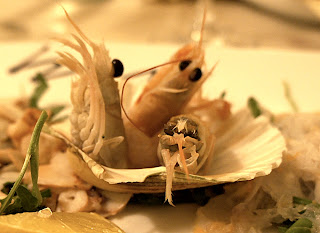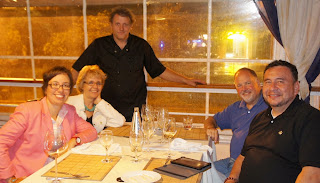It's a testament to the resilience of the Croatian people that over its history a majority of its settlements were fortified or walled, what with almost every major empire of the last 3,000 years running roughshod over the place.
Now the battlements are silent, yet hordes of Russians, Germans and Italians, joined by busloads of Americans, Chinese and Japanese, crisscross Istria, looking for a taste of the Mediterranean "as it was." Visa and Mastercard accepted.
Istria isn't the largest part of Croatia, but it's easily one of the most beautiful, with its dramatic coastlines and steep rolling hills dotted with the region's famous vineyards and olive groves. We can't recommend visiting here enough.
Poreč Marina
After we bailed from hotel hell, we checked into the Hotel Laguna Parentium a mile north of downtown Poreč. We used Booking.com and got an amazing last-minute deal. The place had only reopened in August after a major renovation.
The resort takes its name from the Latin name for Poreč and it's part of a much larger string of hotels which dot the isthmus below the town. It's a huge, beautiful, modern development. Some of the hotels offer private marinas, there is water skiing and a large, open air venue for concerts. The development is owned by the Plava Laguna company. Very impressive.
Exhausted from the previous night, we blew the rest of the day lounging by the pool, swimming in the Adriatic, enjoying local sparkling wines. Sybarite, it's Latin ...
That night we dined at a local haunt called Dvi Murve, just north of town. We started with the minestrone, an order of raw clams and oysters and an order of the Istrian boškarin beef carpaccio. The beef was wonderful, served with slim slices of age, smoked ricotta cheese on top, on a bed of arugula and drizzled with olive oil.
Bob had the grilled langoustines, which, while cooked beautifully, were really, just too much work. They are little lobsters, so you can imagine wrestling through a half-dozen. Tasty, though ... I had the grilled squid, and it was perfect. Light, tender, not chewy.
On Thursday, we drove south, forty minutes, to Pula. Istria is small, you can easily traverse the region, north to south, east to west, in a day. In less time if you drive like a Croatian.
We visited the Roman Amphitheater there. It’s an impressive monument to Rome’s reach and rule with the final stone structure completed in 68 AD.
It had all the amenities of the time: seating for 22,000-plus, awnings to shield people from the sun and an impressive basement under the arena floor proper where gladiators, entertainers and animals were kept prior to the events. Two small side tunnels allowed for dead animals, as well as critically wounded or dead gladiators to be dragged from the arena. This space now houses the museum, showcasing amphorae, as well as olive oil presses from the period.
It’s funny the museum literature quoted Pliny the Elder saying that Istria’s wine and olive oil are only second to Italy’s. We’re not going to argue that one, but will say that it’s a close, close competition.
Some of the marble and limestone was used for construction during the middle ages, but today the amphitheaters stands and looks much as it did to 2000 years ago, only know it seats about 5,000 and hosts concerts and a movie festival in the summer.
We spent the morning in Pula, then the afternoon at the hotel by the pool. That night we dined in town on the marina at the popular Sv Nikola. Boškarin beef filet with black truffles was the main course. Bob had his with a wonderful asparagus and mushroom sauce over fresh tricolor pasta. Wow. I had a hankering for fried potatoes, which were served in a mushroom pinole nut sauce; unexpected, but tasted great with the fries.
As an appetizer, I ordered the house special, a white fish and octopus carpaccio. Both were tender and tasty, nothing flashy, but what stood out were the raw prawns served with the dish, sweeter than any Ebi I’ve had at any sashimi restaurant, including the stalls in Tokyo’s fish market.
MMmmmm, skrimpses ...
On Friday, our last full day in Croatia, we headed into the hills, to the medieval hilltop fortress of Motovun, through the wine country. Now, most, if not all of Croatia’s vineyards are family affairs, with wine grapes growing on lots only a an acre or two in size to maybe on average, 50 acres. In the countryside, people make wine and olive oil, often using cooperative facilities to press the oil and grapes for private production.
Motovun on the hilltop
For those who produce wine for the marketplace, though, many eschew many modern wine production techniques to keep the wines as organic as possible. Still, modern farming techniques have improved consistency of crop yields, though many bottle have a “eco” symbol on the label.
Driving in Istria, despite the modernity of the roads, is difficult. It’s hilly, the roads are narrow, the locals are pushy and impatient, but the countryside is beautiful and as you drive up and down through the center of the land you can’t help but marvel at the fortified towns and fortresses which crown the hilltops. Motovun is particularly impressive, both as a challenging hike and for its beautiful view of the valley below and the hills beyond.
The view from Motovun
I give a lot of credit to Bob for this amazing trip. I was busy with work and Bob handled all the planning. Yes, the agri-tourism inn was hilariously bad, but we landed on our feet and we have a fun story to tell. Plus, there was spit-roasted suckling pig: We call that a win.
So far, we had picked restaurants based on tour books, top 10 websites, concierge recommendations and taking a chance based on hotel proximity and, of course, wild beast roasting on a spit. For the final night, Bob picked the slow food restaurant Toklarija, located a few miles outside the town of Buzet.
Toklarija in the hamlet of Sovinjsko Polje
And by a few miles, I mean a long and winding road up a tiny hill. A road so narrow that we had to reverse back 50 feet to let a tiny Renault go by us at one point. This place gives new meaning to the phrase "out of the way." It's in a 600-year-old olive mill.
Inside the restaurant.
We had tried to get a reservation the night before, but it was sold out. Which was weird, because on the night we dined, Bob and I appeared to be the only guests. And we had the chef and owner Nevio Sirotic waiting on us as well as preparing the meal. He chose the wines – we started with a Teran-based aperitif, then a white wine, a Malvazija, followed by the red, a Teran, both grapes indigenous to Istria – and he just brought out the five courses at a leisurely pace.
Grilled figs with aged ricotta and wild mushrooms drizzled with olive oil. Grilled figs? Who grills figs? I mean, I didn't know they were flowers and not fruits until a week ago. Amazing:
Minestrone soup for two. Croatian's take pride in their version of this hearty staple. It's richer than the Italian version, and seems to have a lot more pork in it:
Mushroom carpaccio on arugula and grated parmigiana. The chef had marinated the mushroom, but when we asked what with, he wasn't telling:
Croatian pršut (prosciutto) and cheese ravioli. Bob hates ravioli. But not this one:
Roasted pork and potatoes. This was savory and juicy and slow-roasted for God knows how many hours. Two Zocor chaser, please:
Chocolate cake and grilled ricotta on fig marmalade. The cake was a rich, with luxurious chocolate cream icing, but it was the cheese which was truly surprising and delightful:
We arrived at 6:30 and didn't leave until almost 10 p.m. And we were the only customers. It was easily the best meal of our whole trip. And the perfect way to end our stay in Croatia. We can't recommend it enough; the people, the scenery, the food and the wine. Don't forget the wine. I didn't ... ;-)
Next stop? Venice.





















































